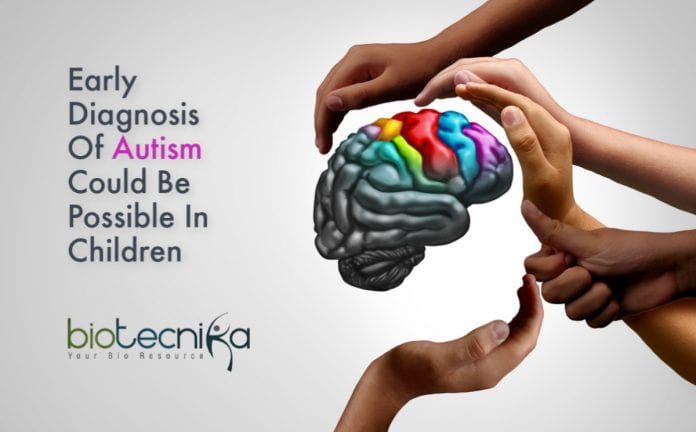A study led by researchers at the School of Medicine has identified a biological marker in children that appears to predict an autism diagnosis early in life.
The cerebrospinal fluid of babies who were later diagnosed with autism showed the presence of a hormone called vasopressin at low levels compared to those who were not. The study carried out in 33 individuals examined the cerebrospinal fluid (CSF) that surrounds the spinal cord and brain. The journal Proceedings of the National Academy of Sciences published the results on April 27.
Karen Parker, Ph.D., associate professor of psychiatry and behavioral sciences, said young children’s brain is put on a developmental trajectory when they aren’t appropriately processing basic social stimuli early in life.-
Shortage of autism specialists often delay diagnosis until age 4 or later, although it could be diagnosed from behavioral symptoms around 2 years of age. Children miss the benefits of early treatment due to this. They could be intervened earlier if there were diagnosed earlier.
The study was led by a research scientist in psychiatry and behavioral sciences at Stanford, Ozge Oztan, Ph.D.
Children diagnosed with autism are characterized by repetitive behavior patterns, restricted interests, and impaired social skills. Affected children can have long-lasting benefits if intervened early.
The nine amino acid long vasopressin is a protein that affects social behavior in male mammals, like fathering and pair-bonding. The better-known hormone with social roles, oxytocin, differs from vasopressin just by two amino acids.
Parker’s team had previously found that levels vasopressin in CSF is lower in children diagnosed with autism than those without the disorder. And most severe symptoms were found in children with the lowest levels of vasopressin in CSF. These findings could lead to the development of the early diagnosis of Autism in children.
The team had also found that kids with autism improved their social ability when administered with vasopressin.
They conducted the new study with CSF samples collected from infants during routine medical care. To rule out brain infections, doctors typically collect CSF from feverish infants younger than 3 months. The leftover CSF that had been frozen for subsequent research purposes were used for this study.
The researchers studied 9 infants from 913 archived CSF samples, who were later diagnosed with autism. The samples of those infants were compared with children who did not show autism by age 12.
The infants who were later diagnosed with autism had significantly lower levels of vasopressin in CSF compared to those who did not have the disorder. The vasopressin levels of seven infants precisely predicted when the infants would develop autism.
The other two samples belonged to children who were later diagnosed with attention deficit hyperactivity disorder also. The oxytocin levels remained the same between both groups of children.
The study needs to be conducted in a larger group to confirm the findings. Her team is planning to study CSF samples from those with other disorders like neuromuscular diseases that have a neurologic component but do not impair social skills, to determine if the low levels of vasopressin are specific to autism. As obtaining CSF samples is difficult, they are hoping to study if there exists any blood biomarker for autism.

